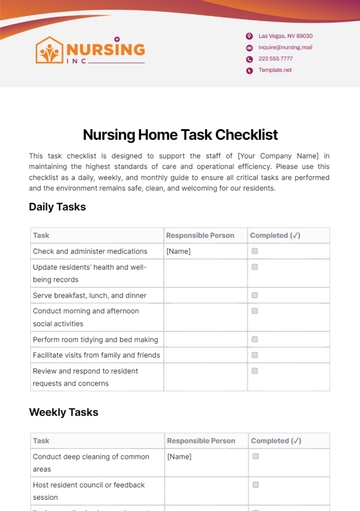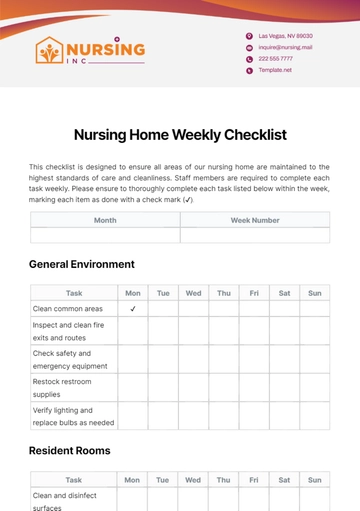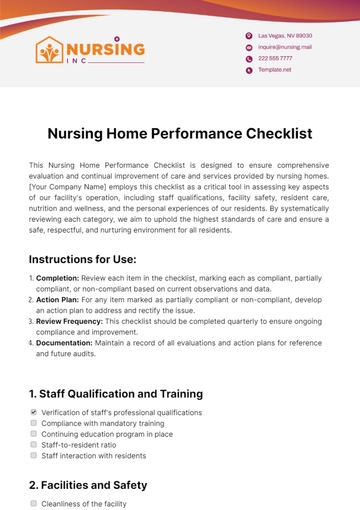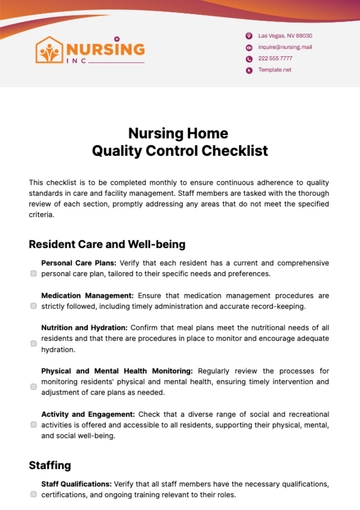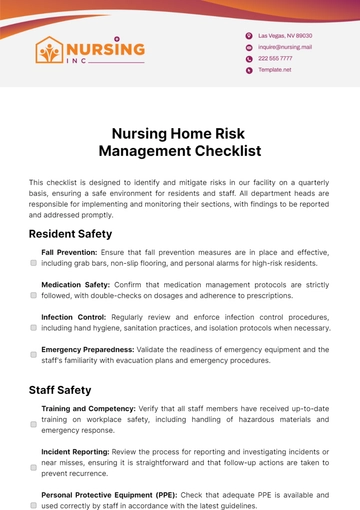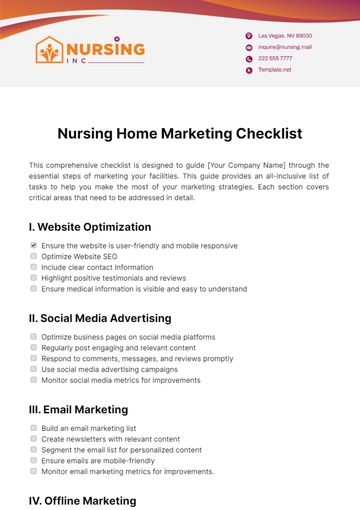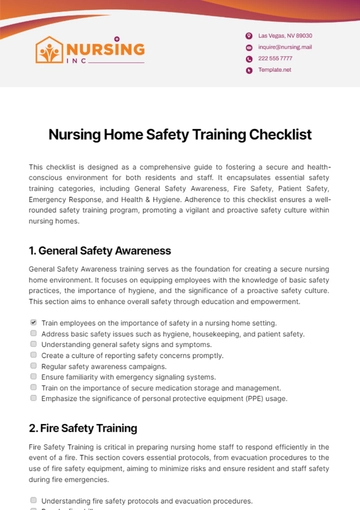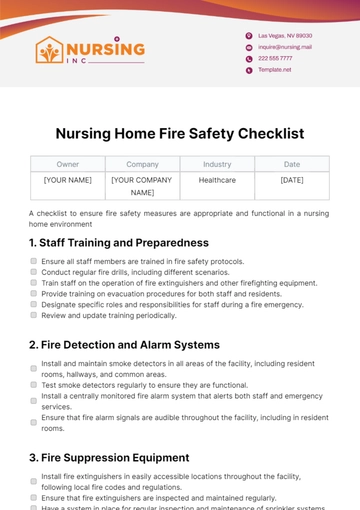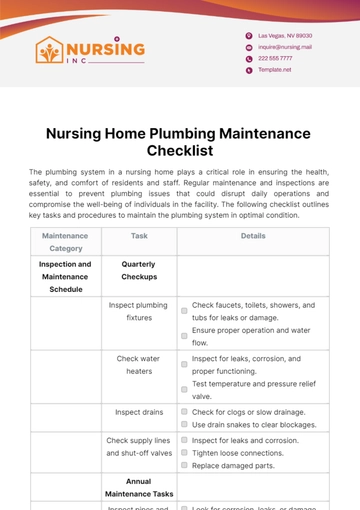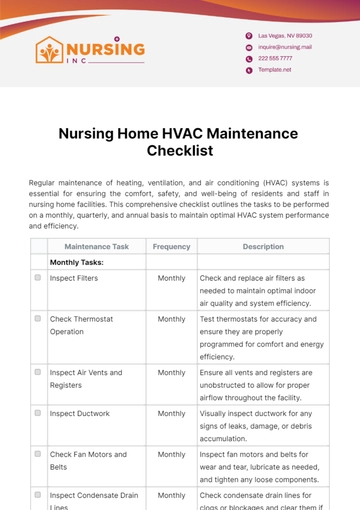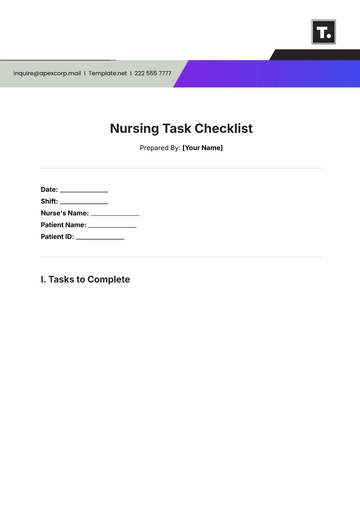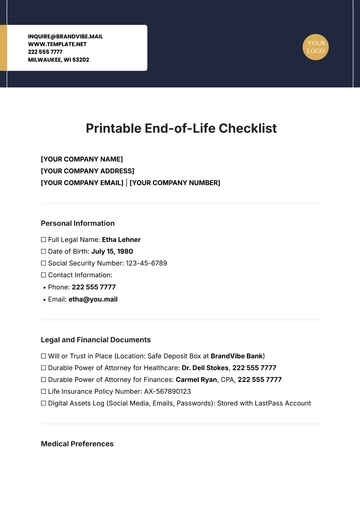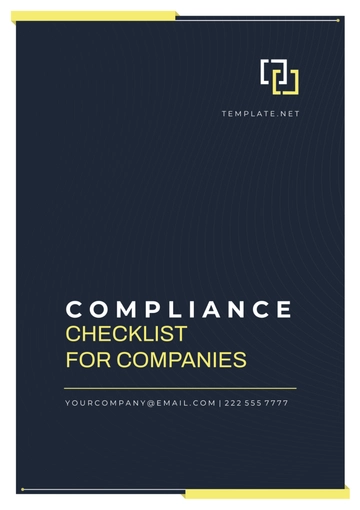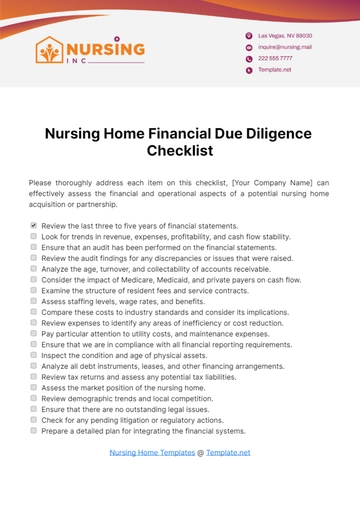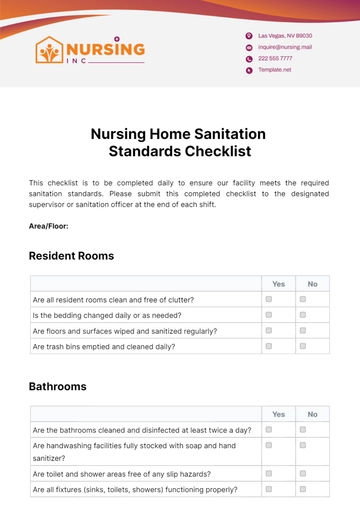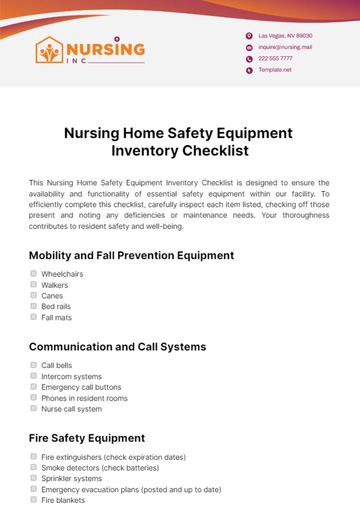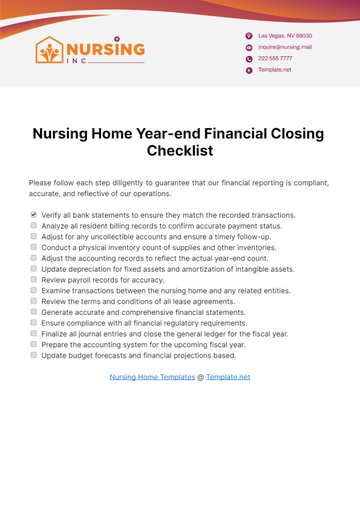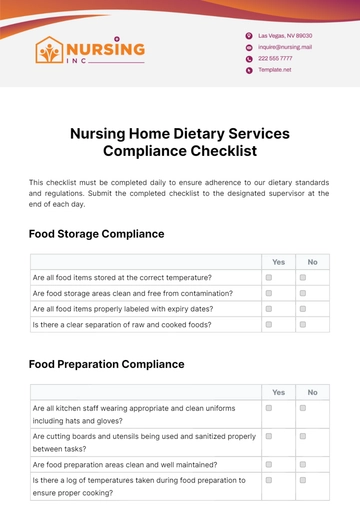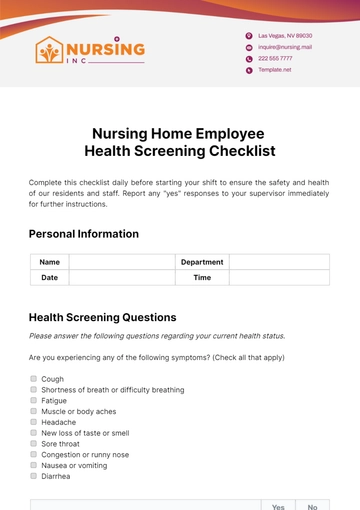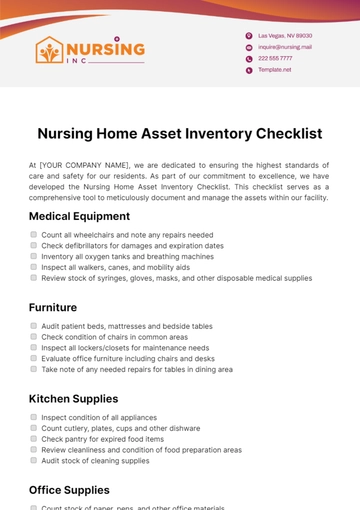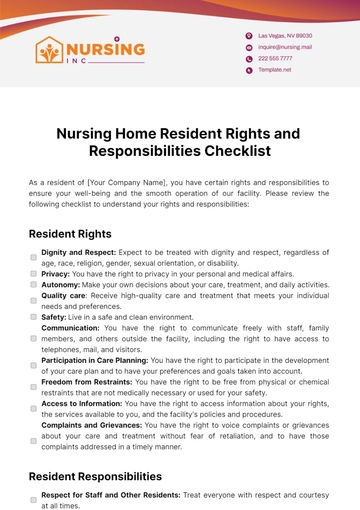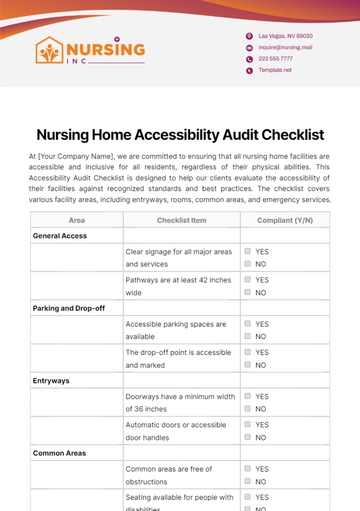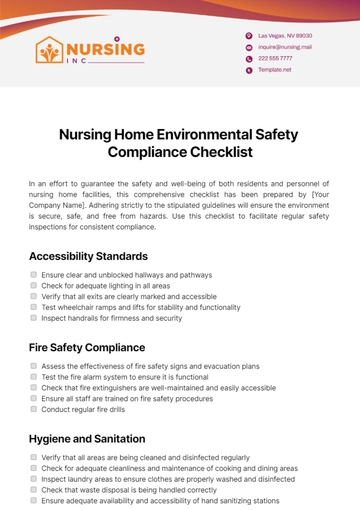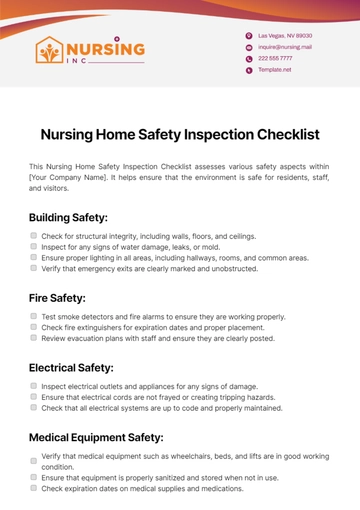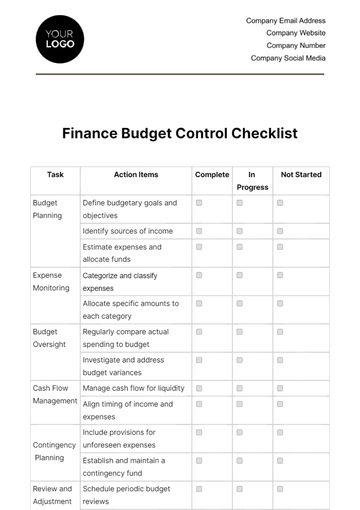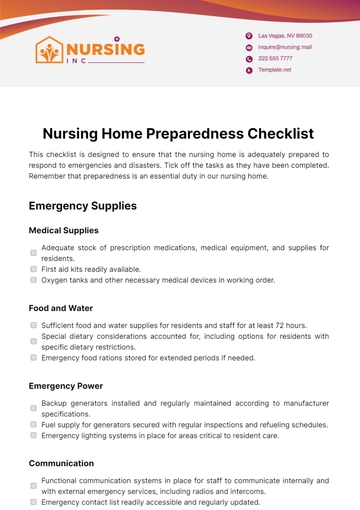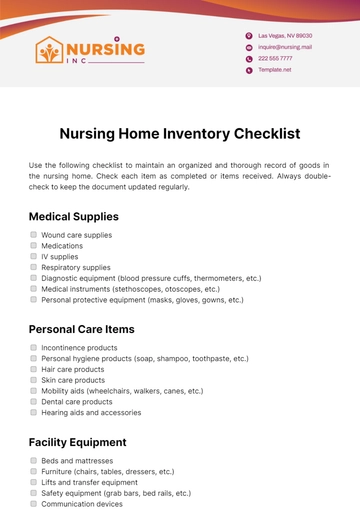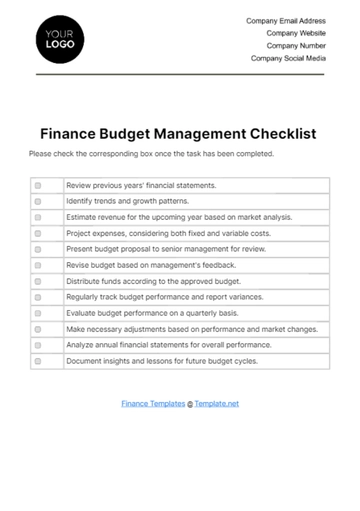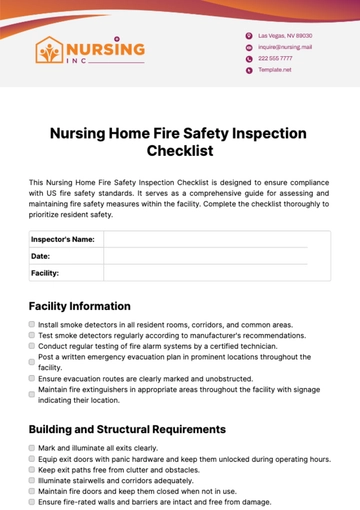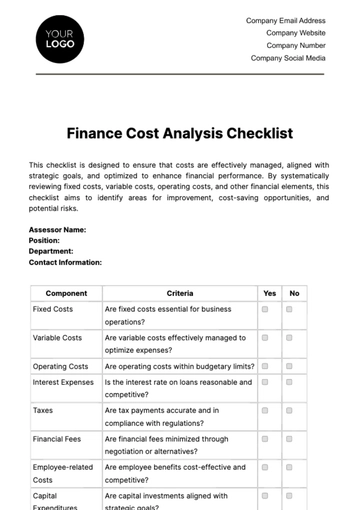Free Nursing Home Compliance Checklist
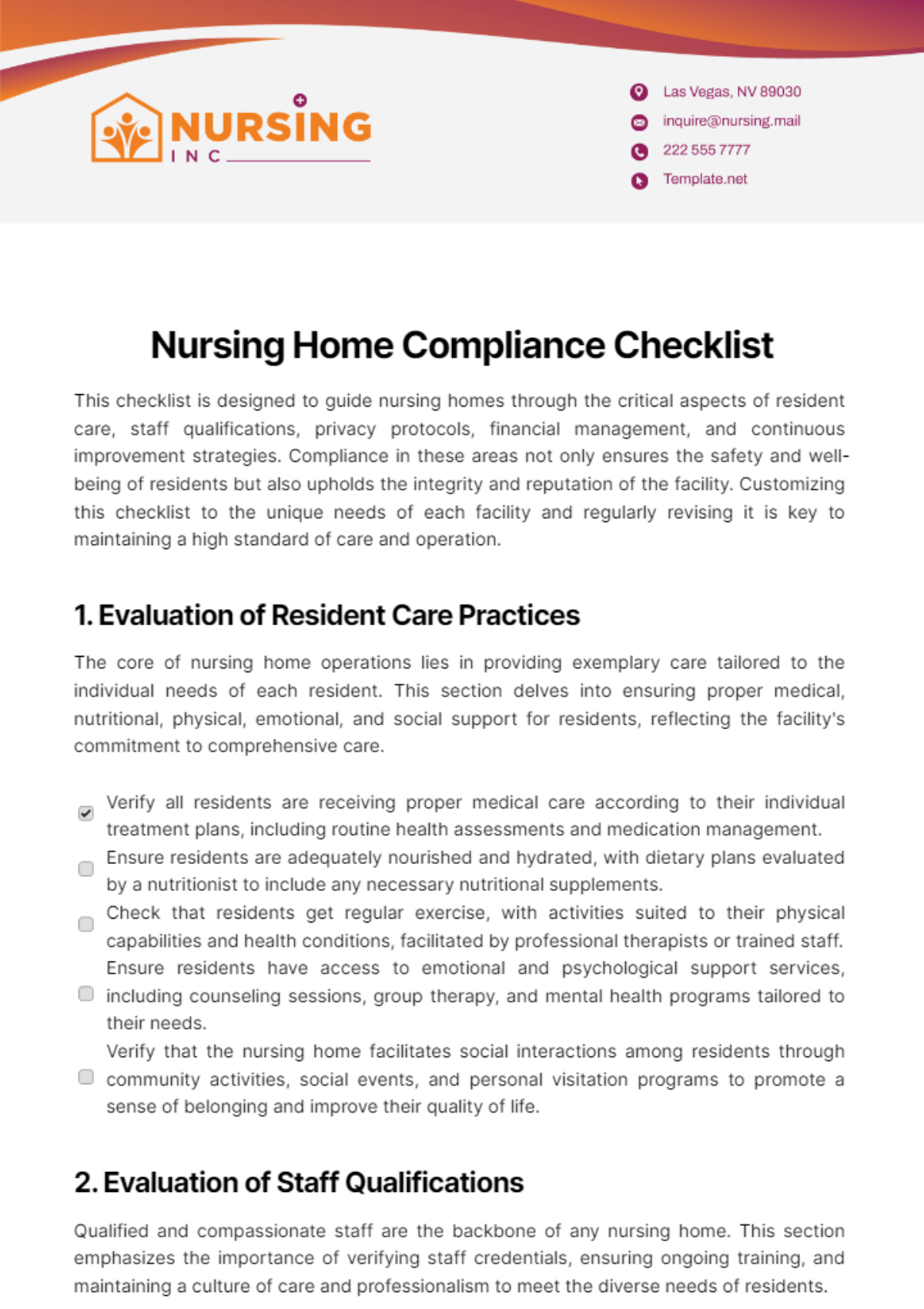
This checklist is designed to guide nursing homes through the critical aspects of resident care, staff qualifications, privacy protocols, financial management, and continuous improvement strategies. Compliance in these areas not only ensures the safety and well-being of residents but also upholds the integrity and reputation of the facility. Customizing this checklist to the unique needs of each facility and regularly revising it is key to maintaining a high standard of care and operation.
1. Evaluation of Resident Care Practices
The core of nursing home operations lies in providing exemplary care tailored to the individual needs of each resident. This section delves into ensuring proper medical, nutritional, physical, emotional, and social support for residents, reflecting the facility's commitment to comprehensive care.
Verify all residents are receiving proper medical care according to their individual treatment plans, including routine health assessments and medication management.
Ensure residents are adequately nourished and hydrated, with dietary plans evaluated by a nutritionist to include any necessary nutritional supplements.
Check that residents get regular exercise, with activities suited to their physical capabilities and health conditions, facilitated by professional therapists or trained staff.
Ensure residents have access to emotional and psychological support services, including counseling sessions, group therapy, and mental health programs tailored to their needs.
Verify that the nursing home facilitates social interactions among residents through community activities, social events, and personal visitation programs to promote a sense of belonging and improve their quality of life.
2. Evaluation of Staff Qualifications
Qualified and compassionate staff are the backbone of any nursing home. This section emphasizes the importance of verifying staff credentials, ensuring ongoing training, and maintaining a culture of care and professionalism to meet the diverse needs of residents.
Verify the credentials, certifications, and licenses of all healthcare and support staff to ensure they meet state and federal regulations.
Assess the continuous education and training programs available to staff, focusing on the latest care techniques, emergency preparedness, and specialized care areas.
Evaluate the staffing ratios to ensure adequate coverage for resident care, with adjustments made for peak times or specialized care needs.
Review staff performance regularly to promote accountability and excellence in care delivery.
3. Evaluation of Privacy Protocols
Protecting the privacy and dignity of residents is a fundamental right. This section reviews the protocols in place to secure personal and medical information, ensuring compliance with privacy laws and fostering a culture of respect and confidentiality.
Assess the implementation of HIPAA (Health Insurance Portability and Accountability Act) guidelines to ensure residents' medical and personal information is securely managed and shared only with authorized personnel.
Evaluate the procedures for residents to confidentially discuss their care, file complaints, or communicate with external entities without fear of retaliation or breach of privacy.
Review the policies and training regarding staff interaction with residents and handling of sensitive information to prevent unauthorized disclosure.
4. Evaluation of Financial Management
Ethical and transparent financial management is crucial for the sustainability and trustworthiness of the nursing home. This section focuses on the oversight of billing practices, budget allocation, and financial reporting to ensure they are conducted with the highest integrity.
Verify compliance with Medicare, Medicaid, and other insurance billing protocols, ensuring accurate and ethical billing practices.
Assess the allocation of the facility's budget to resident care, staff development, and facility maintenance, ensuring financial resources are used efficiently and effectively.
Review financial audits and reports for accuracy and transparency, with procedures in place for addressing any discrepancies or areas of concern.
5. Continuous Improvement Plan
The commitment to continuous improvement is essential for meeting the evolving needs of residents and maintaining compliance with industry standards. This section outlines the processes for evaluating current practices, soliciting feedback, and implementing changes to enhance the quality of care and operation.
Develop and implement a quality improvement program that includes regular assessments of care practices, staff training, resident satisfaction, and operational efficiency.
Solicit feedback from residents, families, and staff to identify areas for improvement, with mechanisms in place for anonymous submissions.
Conduct regular compliance reviews and audits to ensure adherence to all regulatory requirements, with a process for timely correction of identified issues.
Prepared By: [Your Name]
Regularly revising and customizing this checklist to meet the specific needs of your facility is vital for ensuring that all aspects of care and operation are held to the highest standards. This document is a living tool, designed to adapt and evolve with your nursing home, ensuring continued compliance and excellence in care for all residents.
- 100% Customizable, free editor
- Access 1 Million+ Templates, photo’s & graphics
- Download or share as a template
- Click and replace photos, graphics, text, backgrounds
- Resize, crop, AI write & more
- Access advanced editor
The Nursing Home Compliance Checklist Template from Template.net is a vital tool for professionals in the healthcare industry. An intuitive, editable, and customizable document, it allows for clear, accurate record-keeping to ensure nursing home compliance. This template, editable in our AI Editor Tool, provides a streamlined process for compliance monitoring. Aiding in creating an efficiently managed facility, this checklist is an indispensable tool for your everyday use. Immerse in the professional ease it brings.
You may also like
- Cleaning Checklist
- Daily Checklist
- Travel Checklist
- Self Care Checklist
- Risk Assessment Checklist
- Onboarding Checklist
- Quality Checklist
- Compliance Checklist
- Audit Checklist
- Registry Checklist
- HR Checklist
- Restaurant Checklist
- Checklist Layout
- Creative Checklist
- Sales Checklist
- Construction Checklist
- Task Checklist
- Professional Checklist
- Hotel Checklist
- Employee Checklist
- Moving Checklist
- Marketing Checklist
- Accounting Checklist
- Camping Checklist
- Packing Checklist
- Real Estate Checklist
- Cleaning Checklist Service
- New Employee Checklist
- Food Checklist
- Home Inspection Checklist
- Advertising Checklist
- Event Checklist
- SEO Checklist
- Assessment Checklist
- Inspection Checklist
- Baby Registry Checklist
- Induction Checklist
- Employee Training Checklist
- Medical Checklist
- Safety Checklist
- Site Checklist
- Job Checklist
- Service Checklist
- Nanny Checklist
- Building Checklist
- Work Checklist
- Office Checklist
- Training Checklist
- Website Checklist
- IT and Software Checklist
- Performance Checklist
- Project Checklist
- Startup Checklist
- Education Checklist
- Home Checklist
- School Checklist
- Maintenance Checklist
- Planning Checklist
- Manager Checklist
- Wedding Checklist
- Vehicle Checklist
- Travel Agency Checklist
- Vehicle Inspection Checklist
- Interior Design Checklist
- Backpacking Checklist
- Business Checklist
- Legal Checklist
- Nursing Home Checklist
- Weekly Checklist
- Recruitment Checklist
- Salon Checklist
- Baby Checklist
- Equipment Checklist
- Trade Show Checklist
- Party Checklist
- Hospital Bag Checklist
- Evaluation Checklist
- Agency Checklist
- First Apartment Checklist
- Hiring Checklist
- Opening Checklist
- Small Business Checklist
- Rental Checklist
- College Dorm Checklist
- New Puppy Checklist
- University Checklist
- Building Maintenance Checklist
- Work From Home Checklist
- Student Checklist
- Application Checklist
